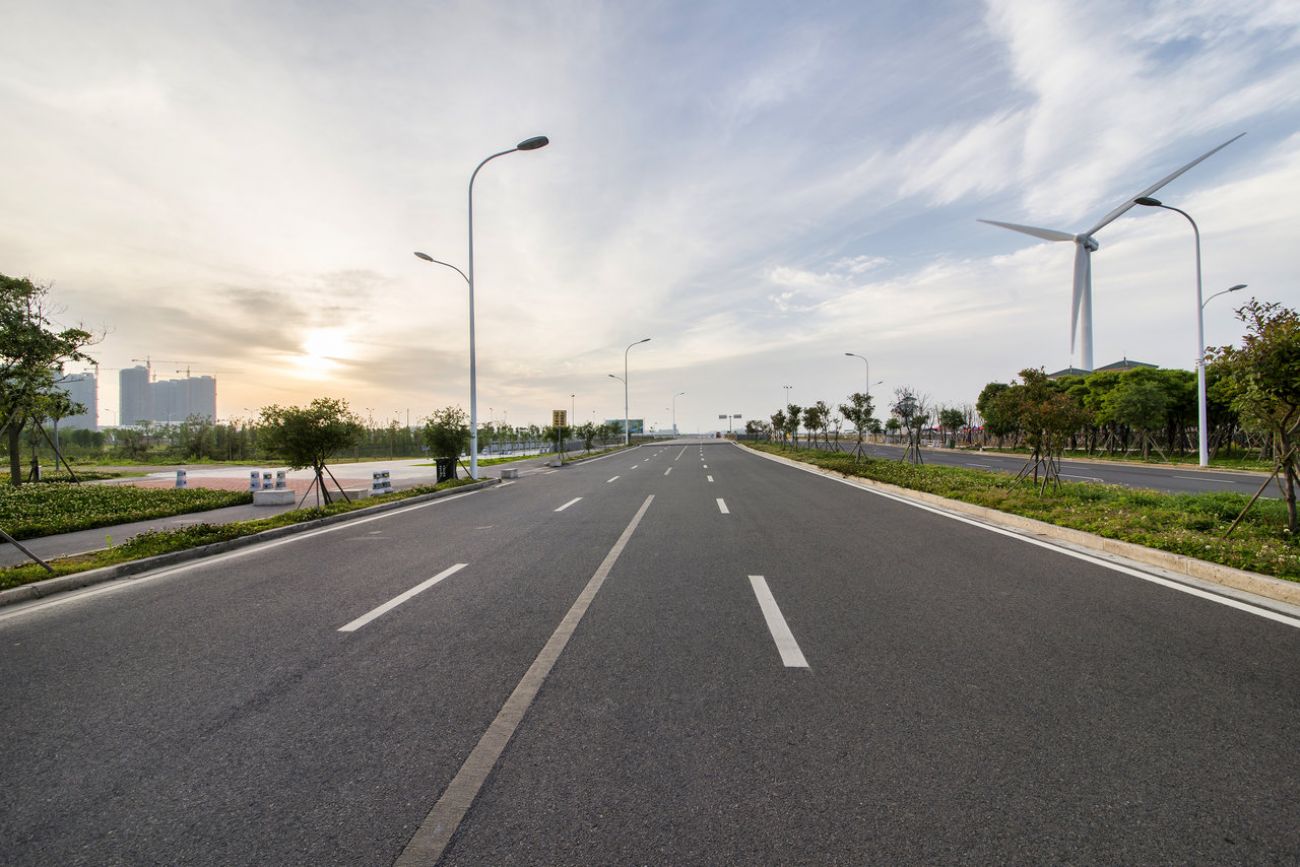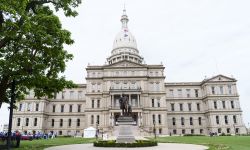Pandemic may mean big profit to Michigan insurers, tiny rebates for drivers

LANSING — In the past few months, Sean Bertolino has made the occasional trip to the hardware store, but leaving home has been “exceedingly rare” amid the pandemic.
Like many Michiganders, the Williamston resident is working from home, virtually eliminating personal travel since late March and, in the process, eliminating almost all risk of getting into an auto crash.
His insurer gave him a $38 refund, he told Bridge
“It was nominal," Bertolino said of the refund, noting he had paid roughly $650 for the six-month policy. “I'm not complaining though, because I wasn't expecting it in the first place. An extra 30 bucks in my pocket is great. It's a pizza night.”
New data show Michigan traffic crashes plummeted as motorists stayed home amid the COVID-19 pandemic. Some experts say auto insurers are poised to make big profits despite providing refunds and rebates mandated by Gov. Gretchen Whitmer.
State filings reviewed by Bridge show many auto insurers have or will pay back Michigan motorists 15 or 20 percent of the premium payments they made in April and May. Some drivers could save upwards of $100, but others could see as little as $10 a month.
- The latest: Michigan coronavirus map, curve, chart, updated COVID-19 news
- Dashboard: Michigan coronavirus testing numbers, trends, COVID-19 data
- June 1: Whitmer lifts stay-at-home order, will allow bars and restaurants to open
- What Whitmer’s new coronavirus order means for Michigan summer plans
- Salons, barbers, gyms to reopen statewide June 15
The customer relief touted by many insurers do not match sharper drops in traffic volume and crashes in a state where premiums have routinely ranked among the highest in the nation, said Steven Gursten, an attorney with Michigan Auto Law in Farmington Hills.
“When you just do the math real quick you realize that while it is nice TV propaganda, it's actually very misleading, and they're certainly keeping a lot more of your money than they're giving back,” said Gursten, who has criticized rebate offerings on his firm’s blog.
“Fewer cars means fewer car accidents and fewer dollars being paid out by the insurers.”
At the height of the pandemic in April, Michigan traffic volumes dropped by more than 40 percent and the number of crashes fell by 60 percent, according to state and federal data.
Whitmer and the Department of Insurance and Financial Services in May ordered insurers to detail plans for customer refunds or premium waivers given their “reduced risk due to extreme reductions in driving during the COVID-19 pandemic.
Companies were required to submit relief plans to the state by Wednesday or provide “an explanation of why a refund or premium waiver is not warranted at this time.”
Filings reviewed by Bridge show state regulators have not yet rejected any plans but have asked for more information or modifications from some insurers. Approved refunds varied considerably by insurer but generally included two or three months of customer relief.
“We are reviewing these filings to ensure drivers get appropriate refunds,” said Laura Hall, a spokesperson for the Department of Insurance and Financial Services. “We encourage drivers to contact their agents to discuss ways they can save on their premiums if they expect long term changes in driving habits, for example those who have been laid off or are telecommuting.”
Erin McDonough, director of the Insurance Alliance of Michigan, said many insurers were "proactive" and offered refunds before they were required by the state, basing them on early projections and the "limited" data available at the time.
"At the onset of the coronavirus outbreak there were many unknowns about how long stay-at-home orders would be in place," McDonough said in a statement.
"In response to that uncertainty, our members began offering different types of payment relief, suspended policy cancellations and waived fees. The vast majority of our members also began providing rebates and discounts to drivers in the initial weeks of the COVID-19 pandemic."
Michigan motorists traveled 42 percent fewer miles in April than they did in the same month last year, the sharpest decline in the region and 13th largest drop among all states, according to estimates compiled by the U.S. Department of Transportation.
Travel on rural Michigan roads dropped an estimated 47 percent in April, while travel on urban roads declined 39 percent.
Travel fell 17 percent in March, when Whitmer’s order took effect in the last week of that month.
May numbers are not yet available but are expected to show a sharp decline in miles travelled as coronavirus restrictions continued.
With fewer cars on the road, preliminary state data show Michigan traffic crashes dropped by 40 percent in March, 60 percent in April and 53 percent in May, when compared to the same months in 2019.
Crashes over those three months fell by more than half, to 33,601 this year from 68,294 crashes over that period in 2019, according to Michigan State Police figures.
Year over year, crashes involving at least one fatality fell 31 percent in March, 34 percent in April and 32 percent in May. The number of crashes involving an injury dropped by 36 percent in March, 60 percent in April and 53 percent in May.
Refunds vary
Insurers offering partial refunds or credits acknowledge they don't yet know the total impact COVID-19 will have on bottom lines.
"This premium reduction is a way to get money back to our policyholders while the full impact of the pandemic is sorted out," Farmers Insurance, which provided 25 percent premium refunds for April and 15 percent for May, wrote in a state filing.
AAA, which insures more than 1 million vehicles in Michigan, will refund customers for 20 percent of the premiums they paid in April and May, guaranteeing a minimum payment of $10. Customers with no fund balance will get a check.
Like most companies, the AAA refund is a percentage of base premium payments that does not include the $220 fee all Michigan motorists were required to pay into the Michigan Catastrophic Claims Association Fund in the past year to cover major medical bills for crash victims.
State filings show AAA’s limited relief is based, partially, on estimates that April vehicle miles traveled would decrease by 35 percent nationwide, rather than the 42 percent drop in Michigan.
The insurer said its “incurred losses” from crash claims dropped 38 percent in March but told state regulators it had increased internal spending to comply with executive orders, including investments in hardware and infrastructure to allow its employees to work from home.
In calculating refunds, AAA also considered the frequency and severity of claims, said Dan Schrock Jr., senior vice president of sales & field/life insurance operations.
"We are seeing that the number of claims per day, and the people that are out driving and producing those claims, is getting dangerously close to pre-COVID [levels,]" Schrock told Bridge on Tuesday.
"The reason companies [provided relief] was because we were saving money, because people weren't having as many accidents because not as many people were driving. We're seeing that trend reverse quite rapidly."
Some smaller insurers have proposed lesser relief not yet approved by the state.
National General told the state it would give its 30,481 Michigan customers a 15 percent premium discount for April only, about $25 each. Northern Mutual promised a one-time refund of $36.
Auto-Owners Insurance, another major insurer in Michigan, is among at least eight companies promising to refund or credit customers for 15 percent of the premiums they paid in April and May. Auto-Owners expects refunds of $21.9 million total for its 492,000 customer, meaning each policyholder should get a total of $45 over two months.
State filings show Auto-Owners based its April and May refunds on March data, even though Whitmer’s first stay-at-home order did not take effect until the last week of that month.
Progressive, touting what it calls an Apron Relief Program, has promised to give active customers a 20 percent credit for April and May premiums. The company also told the state it “may offer additional credits in the upcoming months” but made no guarantees.
GEICO, which controls a small share of the auto insurance market in Michigan, plans to provide a 15 percent premium credit for customers that renew or buy six-month policies by Oct. 8.
One insurer goes further
State Farm, the largest auto insurer in Michigan, has promised more pandemic relief than most competitors in the form of future premium cuts. Beginning in September, premiums for a six-month policy in Michigan will drop by an average of more than 12 percent.
That’s on top of any savings customers will see because of reforms to the state’s auto insurance law that will take effect July 2, the insurer told Bridge.
More immediately, the Illinois-based insurer plans to pay back Michigan customers for 30 percent of the premiums they paid between March 20 and April 31, in the form of either a credit for continuing customers or a check for those who do not renew, according to a filing not yet approved by the state.
State Farm expects to return $81.3 million to Michigan drivers, more than in many other states.
“We’ve observed that driving behaviors continue to evolve during the pandemic,” said regional spokesperson Kevin Gamble. “Our current driving data and claims experience show a considerable decline in miles driven and fewer accidents. Based on trends, each state’s rate cut will vary.”
More insurers should cut future policy premiums because vehicle travel is likely to remain depressed because of the ongoing pandemic even though Michigan and other states have begun to reopen their economies, said Doug Heller, a national insurance expert who conducts research for the Michigan Coalition to Protect Auto-No Fault.
Michigan officials expect auto insurance rates to drop in July when motorists will have new options to purchase policies with reduced medical coverage. Even a customer that continues unlimited medical, which had long been required in Michigan, should save more than 15 percent on the “personal injury protection” portion of their premium, DIFS announced Tuesday.
Those figures are misleading, however, because they include an already announced reduction in the yearly Catastrophic Claims Association fee all Michigan motorists pay, which will drop from $220 to $100 on July 2, Heller said, arguing COVID-19 should prompt further cuts.
"When these new rates take effect, every single one of them will be excessive simply because people aren't driving as much," Heller said. For insurers, “you're either giving back a lot of premium, or you're sitting on a coronavirus windfall."
Business Watch
Covering the intersection of business and policy, and informing Michigan employers and workers on the long road back from coronavirus.
- About Business Watch
- Subscribe
- Share tips and questions with Bridge Business Editor Paula Gardner
Thanks to our Business Watch sponsors.
Support Bridge's nonprofit civic journalism. Donate today.
See what new members are saying about why they donated to Bridge Michigan:
- “In order for this information to be accurate and unbiased it must be underwritten by its readers, not by special interests.” - Larry S.
- “Not many other media sources report on the topics Bridge does.” - Susan B.
- “Your journalism is outstanding and rare these days.” - Mark S.
If you want to ensure the future of nonpartisan, nonprofit Michigan journalism, please become a member today. You, too, will be asked why you donated and maybe we'll feature your quote next time!




